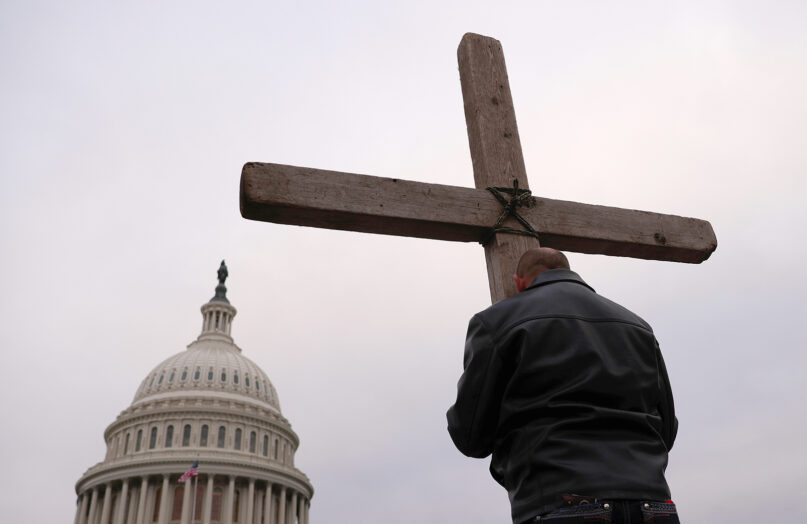(RNS) — I’m so damn tired of living in a country that treats Black grief as a threat and white rage as a sacrament.
I’m upset, but I’m not shocked, that self-entitled and enraged White supremacists — incited by our sociopath president — attacked our nation’s Capitol building, just as I was angry, but not surprised, four years ago, when the Capitol police arrested members of our Black-led protest in that same building.
Our crime? Singing, with the Bishop William Barber III, Rabbi Sharon Brous and a gathering of multiethnic leaders outside then Senate Majority Leader Mitch McConnell’s office to demand that the Republican Senate not take away the Affordable Care Act.
The Capitol police were not opening barriers for us; they did not gently point the way for us. We were Black, and though our protest was appropriate, we were in danger by putting it on display. Earlier, when a Black-led group of leaders staged a die-in on the floor of a cafeteria in the building, we got up at the third warning because the police meant business, and we were afraid.
I’m disturbed about the insurrection of January 6, 2021, and all the circumstances that led up to it. But I disagree with President-elect Biden’s claim that “this is not America.” In fact, it is precisely who we are and who we have always been. White rage is privileged over Black grief.
The first time I experienced white rage was in kindergarten, where I was the only Black child in Mrs. Easley’s classroom, and my best friends were the two Tommies — one blonde and one red-haired. We took naps and ate lunch together. When Lisa, a girl with brown bobbed hair and green eyes, moved to our Air Force base in New Hampshire, she brought the word “n@gger” with her and called me one right before naptime.
At 5, Lisa was already angry that I had something I didn’t deserve — the friendship of these two white boys. Mom had the talk with me that night, that some people wouldn’t like me just because I was Black. She was being gentle; she and Dad grew up in Jim Crow Mississippi and had plenty of experience with white rage.
Mom’s talk opened my eyes and ears to the racism around me. I saw the picture of 14-year-old Emmett Till’s lynched body on the cover of Jet magazine, his face bloated, an eye missing, because he flirted with a white woman. I saw the violent rage of the white police beating marchers on the Pettus Memorial Bridge
Closer to home, I saw the police viciously beat Mr. Johnson across the street from our house while arresting him for outstanding parking tickets. I heard his cries, saw his head bleeding, saw their red faces, twisted in rage.
It was white rage clothed in white sheets that terrorized Black people, hanging men, women and children from trees like strange fruit, gouging eyes, burning flesh. White churchgoers watched and took pictures of the lynchings, holding their children on their shoulders for better sight lines.
Rage baptized the children in the blood of Black people, in the stench of white supremacy. Training them to grow up hating Black people, feeling entitled to step on the rights of Black people, to be in the front of the line, to earn more, live in better spaces and have better schools than Black people. Teaching the children that they have the right to have their knees on the necks — on the fate — of Black people.
And should the Blacks dare to demand equal treatment, dare to protest their existence, dare to write the fury and sadness, the children should grow to resent this as a loud annoyance intended to frustrate the status quo.
Thus, white rage turned brutal at Black wealth amassed in Black communities, enraged at Black students getting into Ivy league schools, enraged that a Black man named Obama with a Muslim name could become president of the United States.
White rage turns violent when beautiful Black trans and queer people dare to walk down the street in freedom; the joy itself incites rage. Chants of Black Lives Matter causes enraged white people to counter that all lives matter. What they really mean is that if a Black life matters, then their white life doesn’t matter enough.
White rage is as American as apple pie. Thomas Jefferson planted the seeds of it in his “Notes on the State of Virginia,” when discussing the emancipation of enslaved Africans:
The first difference which strikes us is that of colour… And is this difference of no importance? Is it not the foundation of a greater or less share of beauty in the two races? … They seem to require less sleep. A black after hard labour through the day, will be induced by the slightest amusements to sit up till midnight, or later, though knowing he must be out with the first dawn of the morning. … They are more ardent after their female: but love seems with them to be more an eager desire, than a tender delicate mixture of sentiment and sensation. Their griefs are transient.
Black grief is not transient; it is generational, incarnate in our bodies. When Black grief dares to mourn publicly, dares to speak the truth of the permanence and pernicious nature of the white entitlement that formed our nation on stolen land, and built it with the brutal system of chattel slavery, that grief is met with disdain. We’re told to get over it.
When teenage boys rap their grief, dance their grief, take their grief to the streets, that grief is criminalized, amplified, coated in words like Black on Black crime. When Black grief is expressed in writing, in social media, in art and song, it is fetishized, appropriated, caricatured.
When Black grief shows up in the office and dares to speak up, demand the demolishing of ceilings, white backlash and white rage interprets that grief as “too angry” for a team player who can’t be coached, and therefore not promoted. Black grief, which of course is angry, is shut down, cut off.
So the grief festers, rots, depresses and kills the soul of Black folk. When Black grief protests, marches in the streets, dies-in on a national floor, it is snatched from the ground, put in handcuffs, thrown in a cell. Beaten like Fannie Lou Hamer and John Lewis. Shot like Medgar Evers and Martin King.
Still, Black grief is prophetic. It knows how to weep, wipe its tears and build a movement. It knows how to keep its eyes on the prize and hold on. It knows that anyone who believes in freedom cannot rest until it comes, until the death — and the life — of a Black mother’s child is as important as a white mother’s child.
Black grief is resilient because it knows its help comes from God, that its hope is built on the love of a poor, brown, Jewish Palestinian baby named Yeshua. It knows that the moral arc of the universe bends toward justice and that nothing is going to turn us around. Black grief gives way to Black joy, because though weeping lasts for a season, joy always comes in the morning.
We are perched upon a dangerous precipice. The meagre gains of Reconstruction were dismantled and gave way to Jim Crow because politicians ignored Black grief and acquiesced to white rage, as they did on Wednesday at the Capitol, as they did in Minneapolis in May: Which of us can forget the rage in the face of the white police officer who crushed George Floyd under his knee?
Who could not recognize the white rage in the violent mob (let’s not call that protest) that rioted in our capital to disrupt our democratic process?
That mob was handled gently, as though their rage was holy. White murderous rage has been tolerated, celebrated and acquitted throughout our history.
But now our leaders must take a different road, one that recognizes white rage for the terrorism it has always been and tend to the Black grief that has been ignored and suppressed for far too long.
As people of faith and moral courage, we must accept our leadership role and join together in prophetic grief and divine outrage to critique our racist culture in which being Black is a preexisting condition for poverty, discrimination and death.

The Rev. Jacqui Lewis. Photo courtesy of Béatrice de Géa
Anti-Black racism is a festering sore, a putrid hole in the soul of America that will only heal with moral courage and furious intention. We are the ones we’ve been waiting for to write a new American story. We must organize across our differences and build strategies for a better tomorrow. We who believe in freedom cannot rest until it comes.
(The Rev. Dr. Jacqui Lewis is senior minister of Middle Collegiate Church in Manhattan. The views expressed in this commentary do not necessarily reflect those of Religion News Service.)












